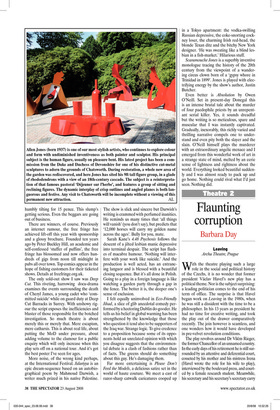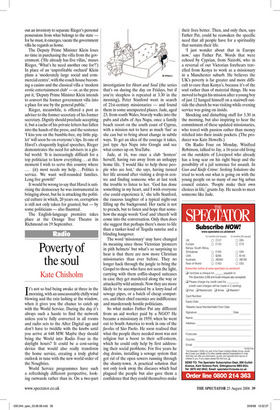Flaunting corruption
Barbara Day
Leaving
Archa Theatre, Prague With the theatre playing such a large role in the social and political history of the Czechs, it is no wonder that former president Václav Havel’s new play has a political theme. Nor is the subject surprising: a leading politician comes to the end of his term of office. The surprise is that Havel began work on Leaving in the 1980s, when he was still a dissident with the time to be a philosopher. In his 13 years as president he had no time for creative writing, and took the play out of the drawer comparatively recently. The join however is seamless, and one wonders how it would have developed in pre-velvet revolution conditions.
The play revolves around Dr Vilém Rieger, the former Chancellor of an unnamed country. In the early days of his retirement he is still surrounded by an attentive and deferential court, cosseted by his mother and his mistress Irena (Havel wrote the role for his wife to play), interviewed by the boulevard press, and courted by a female research student. Meanwhile, his secretary and his secretary’s secretary carry out an inventory to separate Rieger’s personal possessions from what belongs to the state — for he must, it emerges, vacate the government villa he regards as home.
The Deputy Prime Minister Klein loses no time in purchasing the villa from the government. (‘He already has five villas,’ muses Rieger, ‘What’s he need another one for?’) In place of an ‘unprofitable orchard’ Klein plans a ‘moderately large social and commercial centre’, with the coach house becoming a casino and the classical villa a ‘modern erotic entertainment club’ — or, as the press put it, ‘Deputy Prime Minister Klein intends to convert the former government villa into a place for use by the general public.’ Rieger, meanwhile, is offered a post as adviser to the former secretary of his former secretary. Dignity should preclude accepting it, but a cache of his private letters has fallen into the hands of the press, and the sentence ‘I kiss you on the bumble-bee, my little piglet’ will soon be on everyone’s lips. In one of Havel’s eloquently logical speeches, Rieger demonstrates the need for advisers in a global world: ‘It is increasingly difficult for a top politician to know everything ... at this moment I wish to serve this country where ... (it) most needs my help ... Politics is service. We want well-rounded families. Long live growth!’ It would be wrong to say that Havel is satirising the democracy he was instrumental in bringing about, but he is attacking the political culture in which, 20 years on, corruption is still not only taken for granted, but — by some politicians — also flaunted.
The English-language première takes place at the Orange Tree Theatre in Richmond on 19 September.



























































 Previous page
Previous page